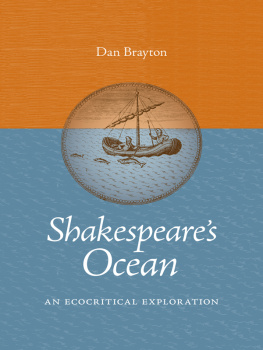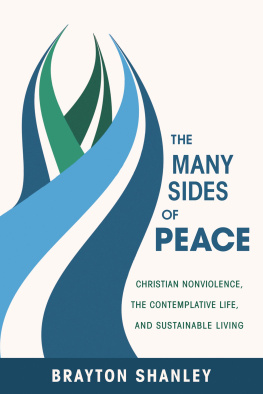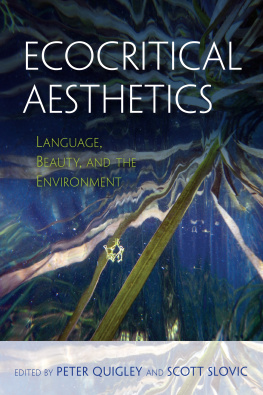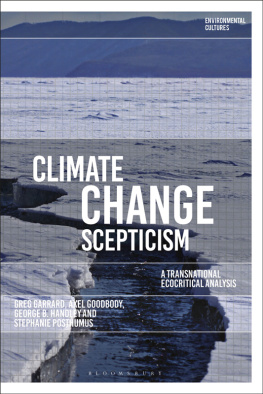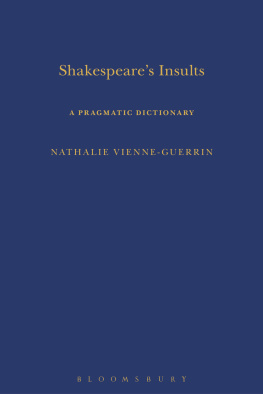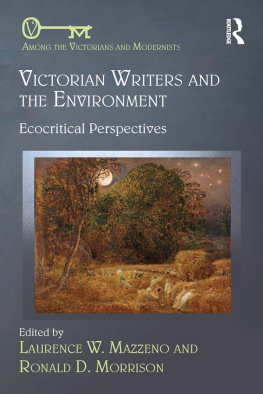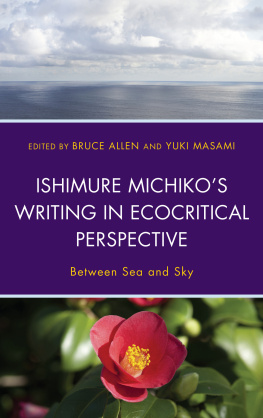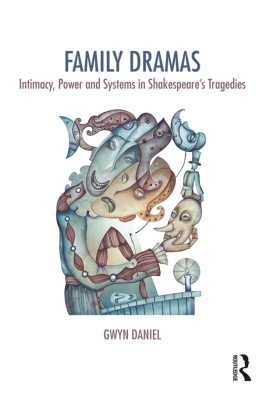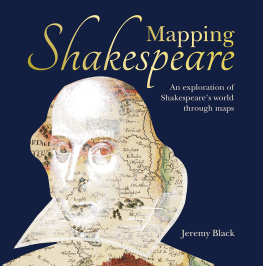Brayton Daniel - Shakespeares ocean: an ecocritical exploration
Here you can read online Brayton Daniel - Shakespeares ocean: an ecocritical exploration full text of the book (entire story) in english for free. Download pdf and epub, get meaning, cover and reviews about this ebook. City: Charlottesville, year: 2018;2012, publisher: University of Virginia Press, genre: Romance novel. Description of the work, (preface) as well as reviews are available. Best literature library LitArk.com created for fans of good reading and offers a wide selection of genres:
Romance novel
Science fiction
Adventure
Detective
Science
History
Home and family
Prose
Art
Politics
Computer
Non-fiction
Religion
Business
Children
Humor
Choose a favorite category and find really read worthwhile books. Enjoy immersion in the world of imagination, feel the emotions of the characters or learn something new for yourself, make an fascinating discovery.
- Book:Shakespeares ocean: an ecocritical exploration
- Author:
- Publisher:University of Virginia Press
- Genre:
- Year:2018;2012
- City:Charlottesville
- Rating:5 / 5
- Favourites:Add to favourites
- Your mark:
- 100
- 1
- 2
- 3
- 4
- 5
Shakespeares ocean: an ecocritical exploration: summary, description and annotation
We offer to read an annotation, description, summary or preface (depends on what the author of the book "Shakespeares ocean: an ecocritical exploration" wrote himself). If you haven't found the necessary information about the book — write in the comments, we will try to find it.
Shakespeares ocean: an ecocritical exploration — read online for free the complete book (whole text) full work
Below is the text of the book, divided by pages. System saving the place of the last page read, allows you to conveniently read the book "Shakespeares ocean: an ecocritical exploration" online for free, without having to search again every time where you left off. Put a bookmark, and you can go to the page where you finished reading at any time.
Font size:
Interval:
Bookmark:
Shakespeares Ocean
U NDER THE S IGN OF N ATURE:
E XPLORATIONS IN E COCRITICISM
Editors
Michael P. Branch, SueEllen Campbell, John Tallmadge
Series Consultants
Lawrence Buell, John Elder, Scott Slovic
Series Advisory Board
Michael P. Cohen, Richard Kerridge, Gretchen Legler, Ian Marshall, Dan Peck, Jennifer Price, Kent Ryden, Rebecca Solnit, Anne Whiston Spirn, Hertha D. Sweet Wong

University of Virginia Press
2012 by the Rector and Visitors of the University of Virginia
All rights reserved
Printed in the United States of America on acid-free paper
First published 2012
1 3 5 7 9 8 6 4 2
L IBRARY OF C ONGRESS C ATALOGING-IN- P UBLICATION D ATA
Brayton, Daniel.
Shakespeares ocean : an ecocritical exploration / Dan Brayton.
p. cm. (Under the sign of nature)
Includes bibliographical references and index.
ISBN 978-0-8139-3226-2 (cloth : acid-free paper)
ISBN 978-0-8139-3227-9 (e-book)
1. Shakespeare, William, 15641616KnowledgeNatural history.
2. Sea in literature. 3. Ecocriticism. I. Title.
PR3039.B73 2012
822.33dc23
2011035953
For
Antonia J. Losano,
shipmate and
soulmate
CONTENTS
FIGURES
PREFACE
Beyond all things is the ocean.
S ENECA
This book was born of nostalgia for a childhood spent on the water. Nostalgiapain felt for a vanishing pastis born of the desire to speak with the dead, as Stephen Greenblatt reminds us in the opening pages of Shakespearean Negotiations. The dead with whom I have yearned to speak are the mariners from all corners of this globe whose knowledge of the ways of the sea has been lost with them. Born in one historic Massachusetts fishing town and raised in another, I often wonder if I was the last child, not in the woods, but on the water (to borrow a phrase from the journalist Richard Louv). The seas bounty, like time itself, seemed to stretch infinitely from the rocky shores of my childhood. The first saltwater fish I pulled up, using a hand line of tarred hemp tied to a black iron hook baited with a clam, was a codiconic of the cold New England waters. A few summers later my father, grandfather, and I loaded an ancient wooden skiff with flounder and the occasional unwanted skate. We threw the skates back and took the flounder home, cleaned and fried them in batter, and ate every one. Today, the groundfish of the Northwest Atlantic (cod, flounder) that I grew up fishing, once so astonishingly abundant as to be the subject of legend (and the basis of many fortunes), are alarmingly depleted (even skate are nearly fished out), the entire marine ecosystem nearly destroyed by human means.
At the start of the twenty-first century we are just beginning to conceive of the oceans finitude. In 1992the year I graduated from collegecommercial fishing on the Grand Banks of Newfoundland was shut down by the Canadian government. Long the richest fishery in the history of the world, the Banks were fished out. As Charles Clover notes in The End of the Line, The Newfoundland cod collapse was the nightmare that shook the world out of its complacent assumption that the seas resources were renewable and being managed in an enlightened manner (111). The nightmare goes on. The 2010 Gulf oil spill destroyed entire ecosystems as well as endangering and impoverishing the lives of countless people. At it happened, the spill coincided with the spawning of the drastically overfished Atlantic bluefin tuna, whichas did the American bison in the nineteenth centuryhovers on the verge of extinction because of unchecked human appetite. It is eminently apparent that we can no longer deny the human role in the history of the global ocean.
While my graduate training was in early modern English literature, owing to unforeseen contingencies I have had the opportunity for the past decade to acquire what sailors call sea time. In addition to spending much of my free time sailing on salt water I have worked on sailing research vessels in the company of marine scientists, marine policy experts, professional mariners, and students from numerous colleges and universities. On voyages in the Atlantic, the Pacific, and the Gulf of Mexico I have witnessed many of the results of the human tendency to treat the ocean as an inexhaustible larder. I have listened as a salmon farmer in Oregon described shooting the skulls off sea lions that occasionally marauded among his fish; I have met watermen in Louisiana who shoot alligators for fun; I have seen firsthand tons of bycatch (commercially undesirable fish) thrown off a trawler to rot or be eaten by scavenging gulls. Once I spent the night at the wharf in Papeete, the harbor at Tahiti, watching in horror as dozens of kill boats used steel cranes to offload the frozen carcasses of large marine predatorsswordfish, marlin, tuna of many varieties, wahooonto an immense factory processor without ceasing, day and night. It seemed they had taken every last big fish they could find in the Pacific. These experiences, and many others like them, lie behind my efforts to locate in literature a representation of human life that defines humanity as part and parcel of the marine environment, not just its plunderer. My hope here is to shed light on how William Shakespeare offers a counterexample to the culture of plunder we now take for granted, for he imagined the ocean not as a void, waste space, adversary, or vast fish cooler but as an integral part of our being.
ACKNOWLEDGMENTS
This book would have never have been written without the support of many colleagues and friends. John Elder has long been my hero and staunch supporter. Timothy Billings is an intellectual pioneer and comrade-in-arms. David Price brought me to the Green Mountains in the first place and encouraged my nautical obsessions. I could not imagine a more generous colleague than Jay Parini. I continually rely on the wisdom and humanity of Brett Millier and the friendly support of Marion Wells, Ian Barrow, Kathy Morse, Yumna Siddiqi, Becky Gould, Cates Baldridge, Jim Berg, and Anna Harlan. I am forever grateful to Alison Byerly, the paragon of provosts, for her herculean efforts on my behalf, to Susan Campbell for her genuine commitment to supporting junior faculty, to Barbara Correll, for her stellar advising, and to Middlebury College for its generous leave policy. I would like to thank David Kramer for his intellectual support over the past decade-and-a-half. Several chapters would not have been possible without access to materials at the Folger Shakespeare Library and the Thomas Fisher Rare Book Library of the University of Toronto; I am grateful to the librarians at both of these fine institutions.
Writing a book is a solitary endeavor, but finishing it for publication is not. The sharp eye and sharper wit of David Steinhardt shaped and strengthened my writing; his input was crucial at nearly every stage. On several occasions Wayne Losano rapidly and thoroughly culled my wordy prose. Megan Batteys work on acquiring images and permissions was simply heroic, for which I am sincerely grateful. Thanks, too, to Jane Chaplin for sharing her skills. I am grateful to Steve Mentz for his pathbreaking work in blue cultural studies, and to Lynne Bruckner for being a wonderful collaborator on Ecocritical Shakespeare. I am also thankful to the staff at the University of Virginia Press, particularly Angie Hogan, Boyd Zenner, Morgan Myers, and Ellen Satrom, and to John Tallmadge and Rob Watson for their wonderful feedback. Beth Inas assistance was invaluable in finishing the manuscript.
Interdisciplinary work depends on collaboration, and I have been fortunate to work with two excellent off-campus maritime studies programs: the Williams-Mystic Program in American Studies at Mystic Seaport (CT), and Sea Education Association, of Woods Hole (MA). Jim Carlton, Director of Williams-Mystic, changed the course of my career when he offered me a job in 2004, as did the rest of our Mystic crew: Rich King, Lisa Gilbert, Katy Hall, Peter Sorensen, Nicole Dobroski, Matt and Emily Geeza, Glenn Gordinier, and Josiah Gardner. Glenn, along with Eric Roorda, the National Endowment for the Humanities, and the Munson Institute, helped set this project in motion in their wonderful NEH Summer Institute. To my Sea Semester friends, Paul Joyce, Mary Malloy, John Odin Jensen, Kara Lavender Law, and Captains Steve Tarrant, Sean Bercaw, Beth Doxsie, and Elliot Rappaport, I am grateful for many a fine voyage.
Next pageFont size:
Interval:
Bookmark:
Similar books «Shakespeares ocean: an ecocritical exploration»
Look at similar books to Shakespeares ocean: an ecocritical exploration. We have selected literature similar in name and meaning in the hope of providing readers with more options to find new, interesting, not yet read works.
Discussion, reviews of the book Shakespeares ocean: an ecocritical exploration and just readers' own opinions. Leave your comments, write what you think about the work, its meaning or the main characters. Specify what exactly you liked and what you didn't like, and why you think so.

